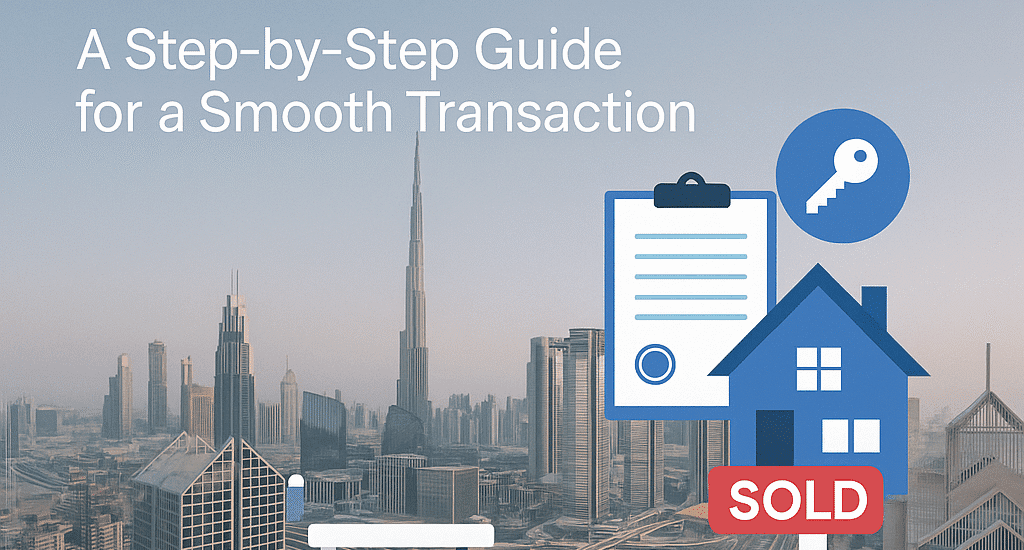Selling property in Dubai can be a rewarding venture, thanks to the city’s dynamic real estate market and strong investor interest. However, to ensure a successful transaction, sellers must follow a structured and legal process. Whether you’re a resident, non-resident, or an investor, understanding the correct steps can save you time, money, and stress. This guide by Heptagon outlines the essential stages involved in selling property in Dubai.
1. Understand the Market Conditions
Before selling property, it’s crucial to analyze current market trends. Dubai’s real estate landscape fluctuates based on supply, demand, and economic conditions. Reviewing recent sales in your area, understanding the buyer demographic, and staying informed about legal changes will help you set realistic expectations. Consider speaking to real estate experts or using property portals for accurate pricing benchmarks.
2. Choose the Right Real Estate Agent
Selling property without professional support can be risky. A licensed real estate agent provides market knowledge, handles viewings, negotiates offers, and ensures all documents are in place. Ensure the agent is registered with the Real Estate Regulatory Agency (RERA) and has a good track record with similar properties. Heptagon recommends choosing agents who understand the legal procedures and local market intricacies.
3. Get a Property Valuation
An objective property valuation is essential when selling property in Dubai. Most agents offer a Comparative Market Analysis (CMA) which compares your unit to similar properties. The right price will attract serious buyers quickly and avoid unnecessary negotiation delays. Overpricing may leave your property on the market longer than necessary, while underpricing reduces your return.
4. Prepare the Necessary Documents
Proper documentation is vital. When selling property, ensure you have:
- A valid Title Deed
- Passport and Emirates ID copies (if applicable)
- No Objection Certificate (NOC) from the developer
- Proof of payment for service charges
- Form A (authorizing your agent to list the property)
If the property is mortgaged, you’ll need a liability letter from your bank and coordinate with the buyer to settle the outstanding amount.
5. Sign the Form F (MOU)
Once you’ve found a buyer, you and the buyer sign Form F, the Memorandum of Understanding (MOU), which outlines the terms and conditions of the sale. This includes the purchase price, transfer date, and any special clauses. It’s a legally binding contract regulated by the Dubai Land Department (DLD), and the buyer usually pays a 10% deposit at this stage.
6. Apply for the NOC from the Developer
Before the final transfer, you must obtain a No Objection Certificate (NOC) from the developer. The developer verifies that all service charges are paid and the buyer is acceptable. Some developers charge a fee for issuing the NOC. The seller and buyer must attend the NOC appointment together, usually at the developer’s office.
7. Finalize the Sale at the DLD
The final stage in selling property involves visiting a DLD Trustee Office to officially transfer ownership. You and the buyer (or your respective representatives with Power of Attorney) will be present, along with your agent. After reviewing the documents and verifying the payment (usually via a manager’s cheque), the DLD will issue a new title deed in the buyer’s name.
8. Settle Agency Commissions and Transfer Fees
Sellers typically pay 2% agency commission unless otherwise negotiated. The DLD also charges a 4% transfer fee, generally paid by the buyer, though this can be split based on the agreement. Make sure all financial obligations are settled at the time of transfer to avoid legal complications later.
9. Cancel Utilities and Update Records
Before handing over the keys, ensure all utility accounts (DEWA, internet, cooling services) are cleared or transferred. Provide the buyer with receipts for the final bills and confirm that all services have been disconnected or transferred appropriately.
10. Consider Tax and Financial Implications
While Dubai has no capital gains tax, international sellers should consult a tax advisor to understand any reporting obligations in their home country. It’s also advisable to inform your bank about the transaction and update any relevant financial records.
Final Thoughts
Selling property in Dubai is a structured and well-regulated process. By following these 10 steps and working with experienced professionals like Heptagon, you can ensure a seamless and profitable transaction. From understanding market trends to securing legal documents and finalizing the deal at the DLD, every phase requires attention to detail and timely execution.
Whether you’re moving on to a new investment or relocating, selling property in Dubai can be a strategic move—when done right.
✅ Ready to Make the Smart Move?
Explore our latest smart home listings or book a free consultation with a Heptagon advisor today. Let’s help you find a home that’s not just modern—but future-ready.
Call us: +971 50 203 5824
Email: info@heptagonproperties.com
Website: https://heptagonproperties.com
Follow us on Instagram | LinkedIn | YouTube | Facebook | Tiktok





